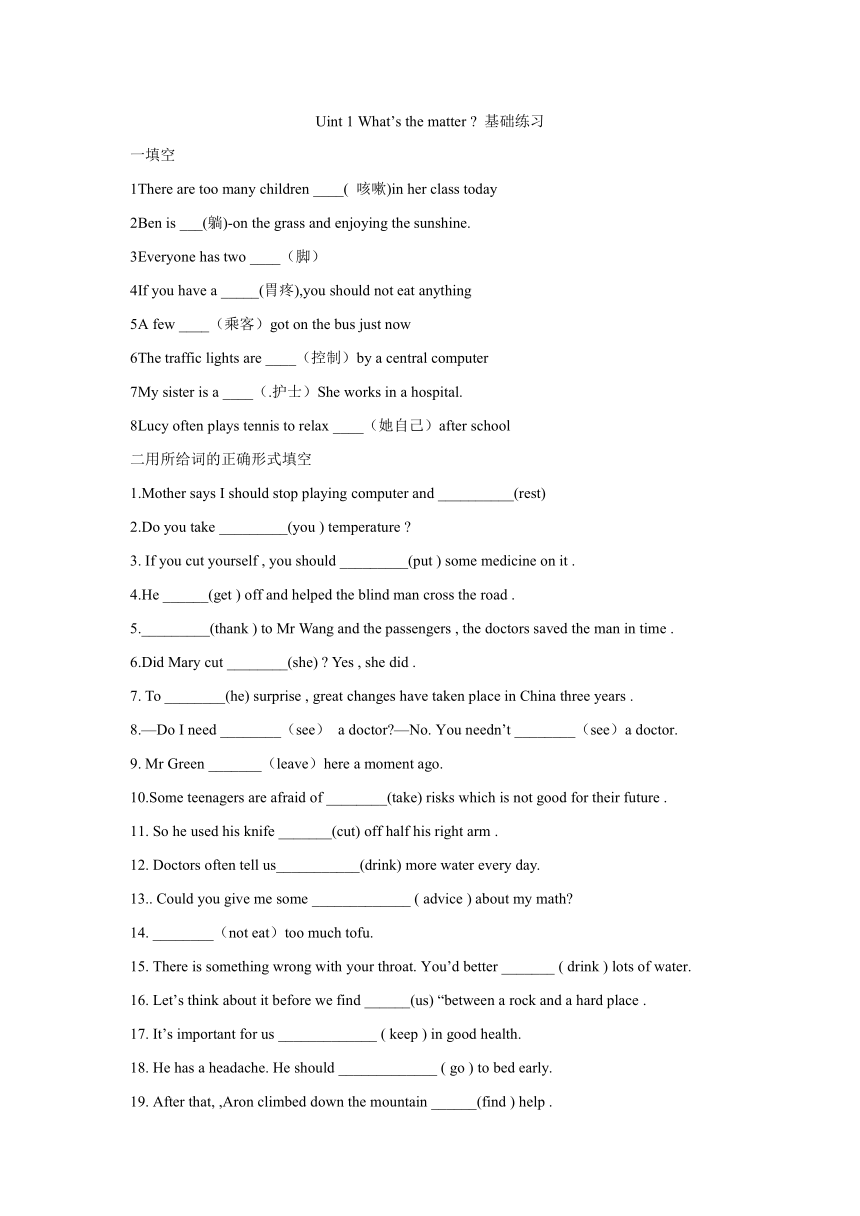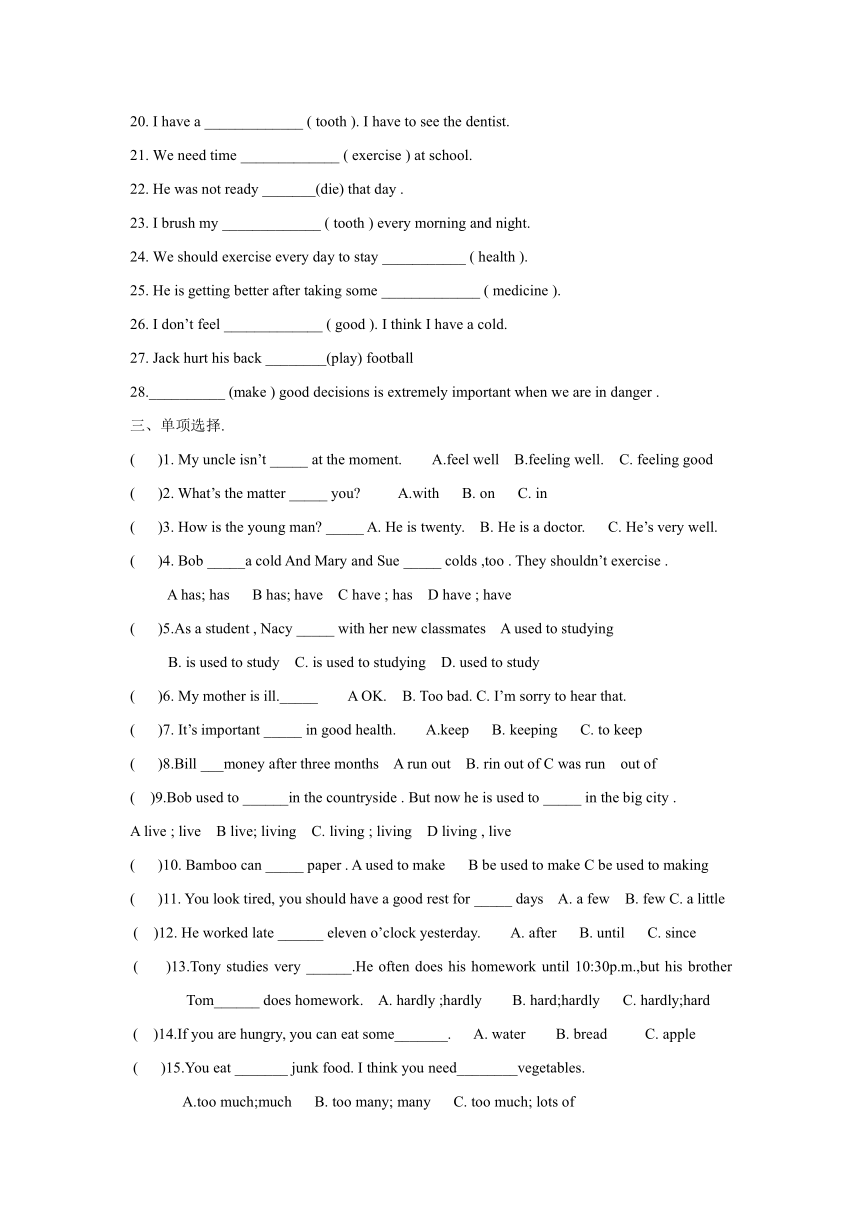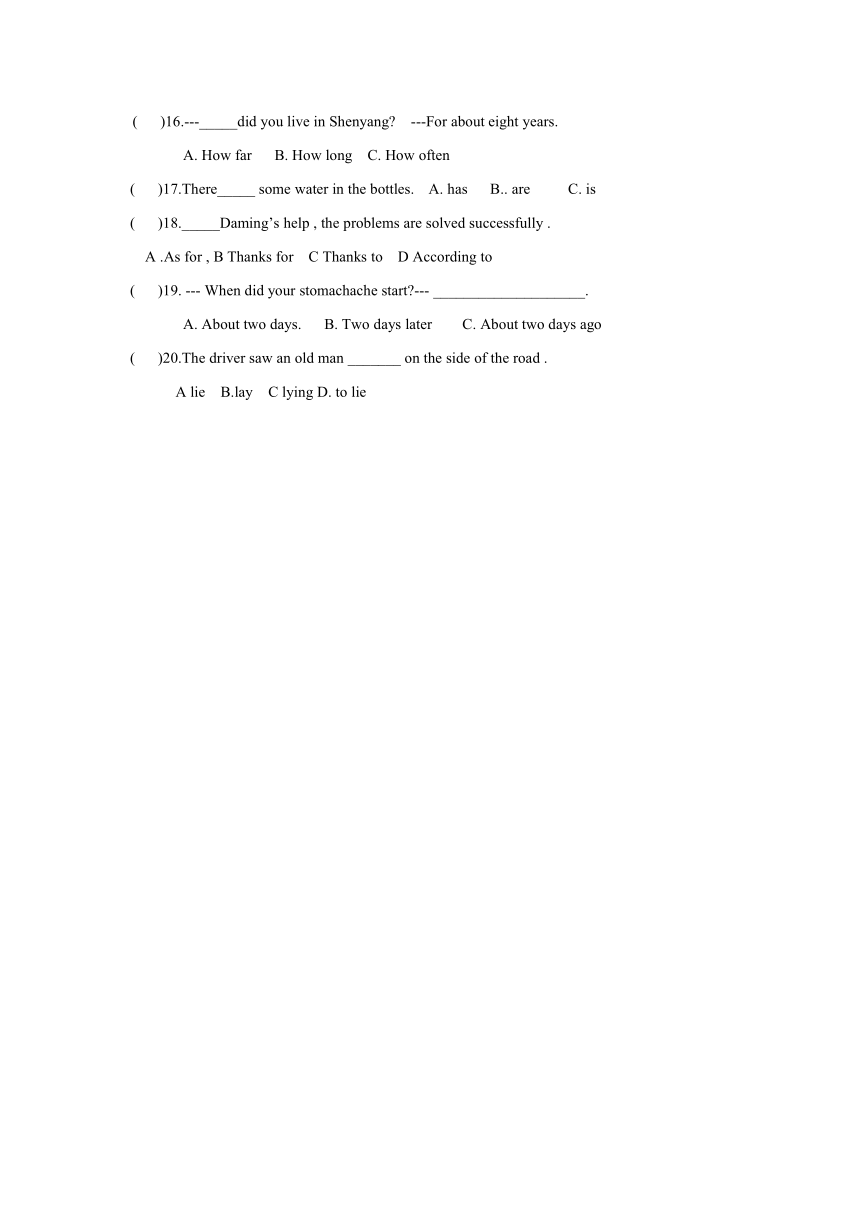Unit 1What's the matter?基础练习(含答案 2024-2025学年人教版英语八年级下册
文档属性
| 名称 | Unit 1What's the matter?基础练习(含答案 2024-2025学年人教版英语八年级下册 |

|
|
| 格式 | docx | ||
| 文件大小 | 28.0KB | ||
| 资源类型 | 教案 | ||
| 版本资源 | 人教新目标(Go for it)版 | ||
| 科目 | 英语 | ||
| 更新时间 | 2025-01-09 00:00:00 | ||
图片预览




文档简介
Uint 1 What’s the matter 基础练习
一填空
1There are too many children ____( 咳嗽)in her class today
2Ben is ___(躺)-on the grass and enjoying the sunshine.
3Everyone has two ____(脚)
4If you have a _____(胃疼),you should not eat anything
5A few ____(乘客)got on the bus just now
6The traffic lights are ____(控制)by a central computer
7My sister is a ____(.护士)She works in a hospital.
8Lucy often plays tennis to relax ____(她自己)after school
二用所给词的正确形式填空
1.Mother says I should stop playing computer and __________(rest)
2.Do you take _________(you ) temperature
3. If you cut yourself , you should _________(put ) some medicine on it .
4.He ______(get ) off and helped the blind man cross the road .
5._________(thank ) to Mr Wang and the passengers , the doctors saved the man in time .
6.Did Mary cut ________(she) Yes , she did .
7. To ________(he) surprise , great changes have taken place in China three years .
8.—Do I need ________(see) a doctor —No. You needn’t ________(see)a doctor.
9. Mr Green _______(leave)here a moment ago.
10.Some teenagers are afraid of ________(take) risks which is not good for their future .
11. So he used his knife _______(cut) off half his right arm .
12. Doctors often tell us___________(drink) more water every day.
13.. Could you give me some _____________ ( advice ) about my math
14. ________(not eat)too much tofu.
15. There is something wrong with your throat. You’d better _______ ( drink ) lots of water.
16. Let’s think about it before we find ______(us) “between a rock and a hard place .
17. It’s important for us _____________ ( keep ) in good health.
18. He has a headache. He should _____________ ( go ) to bed early.
19. After that, ,Aron climbed down the mountain ______(find ) help .
20. I have a _____________ ( tooth ). I have to see the dentist.
21. We need time _____________ ( exercise ) at school.
22. He was not ready _______(die) that day .
23. I brush my _____________ ( tooth ) every morning and night.
24. We should exercise every day to stay ___________ ( health ).
25. He is getting better after taking some _____________ ( medicine ).
26. I don’t feel _____________ ( good ). I think I have a cold.
27. Jack hurt his back ________(play) football
28.__________ (make ) good decisions is extremely important when we are in danger .
三、单项选择.
( )1. My uncle isn’t _____ at the moment. A.feel well B.feeling well. C. feeling good
( )2. What’s the matter _____ you A.with B. on C. in
( )3. How is the young man _____ A. He is twenty. B. He is a doctor. C. He’s very well.
( )4. Bob _____a cold And Mary and Sue _____ colds ,too . They shouldn’t exercise .
A has; has B has; have C have ; has D have ; have
( )5.As a student , Nacy _____ with her new classmates A used to studying
B. is used to study C. is used to studying D. used to study
( )6. My mother is ill._____ A OK. B. Too bad. C. I’m sorry to hear that.
( )7. It’s important _____ in good health. A.keep B. keeping C. to keep
( )8.Bill ___money after three months A run out B. rin out of C was run out of
( )9.Bob used to ______in the countryside . But now he is used to _____ in the big city .
A live ; live B live; living C. living ; living D living , live
( )10. Bamboo can _____ paper . A used to make B be used to make C be used to making
( )11. You look tired, you should have a good rest for _____ days A. a few B. few C. a little
( )12. He worked late ______ eleven o’clock yesterday. A. after B. until C. since
( )13.Tony studies very ______.He often does his homework until 10:30p.m.,but his brother Tom______ does homework. A. hardly ;hardly B. hard;hardly C. hardly;hard
( )14.If you are hungry, you can eat some_______. A. water B. bread C. apple
( )15.You eat _______ junk food. I think you need________vegetables.
A.too much;much B. too many; many C. too much; lots of
( )16.---_____did you live in Shenyang ---For about eight years.
A. How far B. How long C. How often
( )17.There_____ some water in the bottles. A. has B.. are C. is
( )18._____Daming’s help , the problems are solved successfully .
A .As for , B Thanks for C Thanks to D According to
( )19. --- When did your stomachache start --- ____________________.
A. About two days. B. Two days later C. About two days ago
( )20.The driver saw an old man _______ on the side of the road .
A lie B.lay C lying D. to lie
一、填空
coughing
解析:“There be + 主语 + doing sth.” 表示 “有某人正在做某事”,“咳嗽” 是 “cough”,此处用现在分词形式 “coughing”。
lying
解析:根据 “is” 以及 “and enjoying” 可知此处用现在分词形式,构成现在进行时,“躺” 是 “lie”,现在分词是 “lying”。
feet
解析:“foot”(脚)的复数形式是 “feet”,“two” 后接复数名词,所以填 “feet”。
stomachache
解析:“胃疼” 是 “stomachache”,根据 “a” 可知用单数形式,所以填 “stomachache”。
passengers
解析:“a few” 后接可数名词复数形式,“乘客” 是 “passenger”,其复数是 “passengers”。
controlled
解析:“The traffic lights” 和 “control” 是被动关系,此处用一般现在时的被动语态,结构为 “be + 过去分词”,“control” 的过去分词是 “controlled”。
nurse
解析:“a” 后接可数名词单数,“护士” 是 “nurse”,所以填 “nurse”。
herself
解析:“relax oneself” 表示 “放松自己”,主语 “Lucy” 是女性,所以用反身代词 “herself”。
二、用所给词的正确形式填空
rest
解析:“should” 是情态动词,后接动词原形,所以填 “rest”。
your
解析:修饰名词 “temperature” 要用形容词性物主代词,“you” 的形容词性物主代词是 “your”,所以填 “your”。
put
解析:“should” 是情态动词,后接动词原形,所以填 “put”。
got
解析:根据 “and helped” 可知此处用一般过去时,“get” 的过去式是 “got”,所以填 “got”。
Thanks
解析:“Thanks to...” 是固定短语,意为 “多亏,由于”,句首首字母大写,所以填 “Thanks”。
herself
解析:“cut oneself” 表示 “割伤自己”,主语 “Mary” 是女性,所以用反身代词 “herself”。
his
解析:“To one's surprise” 是固定短语,意为 “令某人惊讶的是”,此处用形容词性物主代词 “his”,所以填 “his”。
to see; see
解析:“need” 作实义动词时,常用 “need to do sth.” 结构,否定回答中 “need” 是情态动词,后接动词原形,所以依次填 “to see; see”。
left
解析:“a moment ago” 表示 “刚才”,是一般过去时的时间标志,“leave” 的过去式是 “left”,所以填 “left”。
taking
解析:“be afraid of doing sth.” 是固定用法,意为 “害怕做某事”,所以填 “taking”。
to cut
解析:“use sth. to do sth.” 是固定用法,意为 “用某物做某事”,所以填 “to cut”。
to drink
解析:“tell sb. to do sth.” 是固定用法,意为 “告诉某人做某事”,所以填 “to drink”。
advice
解析:“advice” 是不可数名词,“some” 后接不可数名词 “advice”,表示一些建议,所以填 “advice”。
Don't eat
解析:此处是祈使句的否定形式,在动词原形前加 “Don't”,所以填 “Don't eat”。
drink
解析:“had better” 后接动词原形,意为 “最好做某事”,所以填 “drink”。
ourselves
解析:“find oneself...” 表示 “发现自己处于……”,主语是 “we”,所以用反身代词 “ourselves”。
to keep
解析:“It's + 形容词 + for sb. to do sth.” 是固定句型,意为 “对某人来说做某事是…… 的”,所以填 “to keep”。
go
解析:“should” 是情态动词,后接动词原形,所以填 “go”。
to find
解析:此处用动词不定式表示目的,爬山的目的是寻求帮助,所以填 “to find”。
toothache
解析:“have a toothache” 表示 “牙疼”,所以填 “toothache”。
to exercise
解析:“need time to do sth.” 表示 “需要时间做某事”,所以填 “to exercise”。
to die
解析:“be ready to do sth.” 是固定用法,意为 “准备好做某事”,所以填 “to die”。
teeth
解析:“brush one's teeth” 表示 “刷牙”,“tooth” 的复数是 “teeth”,所以填 “teeth”。
healthy
解析:“stay” 是系动词,后接形容词作表语,“health” 的形容词是 “healthy”,所以填 “healthy”。
medicine
解析:“medicine” 是不可数名词,“some” 后接不可数名词 “medicine”,表示一些药,所以填 “medicine”。
well
解析:“feel” 是系动词,后接形容词作表语,“good” 强调事物本身的好,“well” 可指身体好,此处指感觉身体不舒服,所以填 “well”。
playing
解析:此处用现在分词形式作状语,表示伴随情况,“Jack” 在踢足球时伤了后背,所以填 “playing”。
Making
解析:此处是动名词短语作主语,“make” 的动名词形式是 “Making”,所以填 “Making”。
三、单项选择
答案:B
解析:“isn't” 后接现在分词构成现在进行时,“feel” 是系动词,描述身体状况好用 “well”,不用 “good”,所以选 B,表示此刻感觉不舒服。
答案:A
解析:“What's the matter with sb.” 是固定句型,意为 “某人怎么了”,所以选 A。
答案:C
解析:问句 “How is the young man ” 是询问年轻人的身体状况,“He's very well.” 表示身体很好,符合语境,所以选 C。“He is twenty.”(他二十岁了);“He is a doctor.”(他是一名医生)不符合对身体状况询问的回答要求。
答案:B
解析:主语 “Bob” 是第三人称单数,谓语动词用 “has”;“Mary and Sue” 是两个人,作主语时谓语动词用复数形式 “have”,所以选 B。
答案:C
解析:“be used to doing sth.” 表示 “习惯于做某事”,符合语境,说南希习惯于和新同学一起学习,所以选 C。“used to do sth.” 表示 “过去常常做某事”。
答案:C
解析:听到别人说不好的消息(妈妈生病了),常用 “I'm sorry to hear that.” 来回应,表示同情,所以选 C。“OK.”(好的);“Too bad.”(太糟糕了)不符合此处回应语境。
答案:C
解析:“It's important to do sth.” 是固定句型,意为 “做某事是重要的”,所以选 C。
答案:B
解析:“run out of” 表示 “用完,耗尽”,主语 “Bill” 和 “run out of” 是主动关系,此处描述过去的事情,用一般过去时,所以选 B。“run out”(用完,不及物短语,常表示某物用完了)不符合此处用法要求。
答案:B
解析:“used to do sth.” 表示 “过去常常做某事”,“be used to doing sth.” 表示 “习惯于做某事”,所以选 B,说鲍勃过去住在乡下,现在习惯住在大城市。
答案:B
解析:“be used to do sth.” 表示 “被用来做某事”,竹子被用来造纸,符合语境,所以选 B。
答案:A
解析:“a few” 后接可数名词复数,“days” 是可数名词复数,“a few” 表示 “一些,几个”,符合语境,说应该好好休息几天;“few” 表示 “几乎没有”,有否定含义;“a little” 后接不可数名词,所以选 A。
答案:B
解析:“until” 表示 “直到……”,符合语境,说工作到昨天十一点,所以选 B。“after”(在…… 之后);“since”(自从…… 以来)不符合此处语义。
答案:B
解析:“hard” 作副词时表示 “努力地”,“hardly” 表示 “几乎不”,根据 “studies very...” 可知是学习很努力,“but” 表示转折,后面说几乎不做作业,所以选 B。
答案:B
解析:“hungry”(饿了),应该吃食物,“water”(水)不符合,“bread”(面包)是不可数名词,符合语境,“apple”(苹果)是可数名词,此处用复数形式才合适,所以选 B。
答案:C
解析:“junk food” 是不可数名词,用 “too much” 修饰;“vegetables” 是可数名词复数,用 “lots of” 修饰,所以选 C。“too many” 后接可数名词复数;“much” 后接不可数名词。
答案:B
解析:根据答语 “For about eight years.” 可知是询问时间段,用 “How long” 提问,所以选 B。“How far”(多远,询问距离);“How often”(多久一次,询问频率)。
答案:C
解析:“There be” 句型遵循就近原则,“water” 是不可数名词,所以用 “There is”,选 C。
答案:C
解析:“Thanks to...” 是固定短语,意为 “多亏,由于”,符合语境,说多亏大明的帮助,问题成功解决了,所以选 C。“As for”(至于,关于);“Thanks for”(因…… 而感谢);“According to”(根据)不符合此处语义。
答案:C
解析:询问肚子疼什么时候开始的,回答用时间点或时间段 + ago 表示过去的时间,所以选 C。“About two days.”(大约两天,不明确是过去还是将来等时间概念);“Two days later”(两天后,常用于一般将来时)不符合此处语境。
答案:C
解析:“see sb. doing sth.” 表示 “看见某人正在做某事”,符合语境,说看见老人正躺在路边,所以选 C。“see sb. do sth.”(看见某人做某事,强调动作的全过程)不符合此处强调正在进行的语境。
一填空
1There are too many children ____( 咳嗽)in her class today
2Ben is ___(躺)-on the grass and enjoying the sunshine.
3Everyone has two ____(脚)
4If you have a _____(胃疼),you should not eat anything
5A few ____(乘客)got on the bus just now
6The traffic lights are ____(控制)by a central computer
7My sister is a ____(.护士)She works in a hospital.
8Lucy often plays tennis to relax ____(她自己)after school
二用所给词的正确形式填空
1.Mother says I should stop playing computer and __________(rest)
2.Do you take _________(you ) temperature
3. If you cut yourself , you should _________(put ) some medicine on it .
4.He ______(get ) off and helped the blind man cross the road .
5._________(thank ) to Mr Wang and the passengers , the doctors saved the man in time .
6.Did Mary cut ________(she) Yes , she did .
7. To ________(he) surprise , great changes have taken place in China three years .
8.—Do I need ________(see) a doctor —No. You needn’t ________(see)a doctor.
9. Mr Green _______(leave)here a moment ago.
10.Some teenagers are afraid of ________(take) risks which is not good for their future .
11. So he used his knife _______(cut) off half his right arm .
12. Doctors often tell us___________(drink) more water every day.
13.. Could you give me some _____________ ( advice ) about my math
14. ________(not eat)too much tofu.
15. There is something wrong with your throat. You’d better _______ ( drink ) lots of water.
16. Let’s think about it before we find ______(us) “between a rock and a hard place .
17. It’s important for us _____________ ( keep ) in good health.
18. He has a headache. He should _____________ ( go ) to bed early.
19. After that, ,Aron climbed down the mountain ______(find ) help .
20. I have a _____________ ( tooth ). I have to see the dentist.
21. We need time _____________ ( exercise ) at school.
22. He was not ready _______(die) that day .
23. I brush my _____________ ( tooth ) every morning and night.
24. We should exercise every day to stay ___________ ( health ).
25. He is getting better after taking some _____________ ( medicine ).
26. I don’t feel _____________ ( good ). I think I have a cold.
27. Jack hurt his back ________(play) football
28.__________ (make ) good decisions is extremely important when we are in danger .
三、单项选择.
( )1. My uncle isn’t _____ at the moment. A.feel well B.feeling well. C. feeling good
( )2. What’s the matter _____ you A.with B. on C. in
( )3. How is the young man _____ A. He is twenty. B. He is a doctor. C. He’s very well.
( )4. Bob _____a cold And Mary and Sue _____ colds ,too . They shouldn’t exercise .
A has; has B has; have C have ; has D have ; have
( )5.As a student , Nacy _____ with her new classmates A used to studying
B. is used to study C. is used to studying D. used to study
( )6. My mother is ill._____ A OK. B. Too bad. C. I’m sorry to hear that.
( )7. It’s important _____ in good health. A.keep B. keeping C. to keep
( )8.Bill ___money after three months A run out B. rin out of C was run out of
( )9.Bob used to ______in the countryside . But now he is used to _____ in the big city .
A live ; live B live; living C. living ; living D living , live
( )10. Bamboo can _____ paper . A used to make B be used to make C be used to making
( )11. You look tired, you should have a good rest for _____ days A. a few B. few C. a little
( )12. He worked late ______ eleven o’clock yesterday. A. after B. until C. since
( )13.Tony studies very ______.He often does his homework until 10:30p.m.,but his brother Tom______ does homework. A. hardly ;hardly B. hard;hardly C. hardly;hard
( )14.If you are hungry, you can eat some_______. A. water B. bread C. apple
( )15.You eat _______ junk food. I think you need________vegetables.
A.too much;much B. too many; many C. too much; lots of
( )16.---_____did you live in Shenyang ---For about eight years.
A. How far B. How long C. How often
( )17.There_____ some water in the bottles. A. has B.. are C. is
( )18._____Daming’s help , the problems are solved successfully .
A .As for , B Thanks for C Thanks to D According to
( )19. --- When did your stomachache start --- ____________________.
A. About two days. B. Two days later C. About two days ago
( )20.The driver saw an old man _______ on the side of the road .
A lie B.lay C lying D. to lie
一、填空
coughing
解析:“There be + 主语 + doing sth.” 表示 “有某人正在做某事”,“咳嗽” 是 “cough”,此处用现在分词形式 “coughing”。
lying
解析:根据 “is” 以及 “and enjoying” 可知此处用现在分词形式,构成现在进行时,“躺” 是 “lie”,现在分词是 “lying”。
feet
解析:“foot”(脚)的复数形式是 “feet”,“two” 后接复数名词,所以填 “feet”。
stomachache
解析:“胃疼” 是 “stomachache”,根据 “a” 可知用单数形式,所以填 “stomachache”。
passengers
解析:“a few” 后接可数名词复数形式,“乘客” 是 “passenger”,其复数是 “passengers”。
controlled
解析:“The traffic lights” 和 “control” 是被动关系,此处用一般现在时的被动语态,结构为 “be + 过去分词”,“control” 的过去分词是 “controlled”。
nurse
解析:“a” 后接可数名词单数,“护士” 是 “nurse”,所以填 “nurse”。
herself
解析:“relax oneself” 表示 “放松自己”,主语 “Lucy” 是女性,所以用反身代词 “herself”。
二、用所给词的正确形式填空
rest
解析:“should” 是情态动词,后接动词原形,所以填 “rest”。
your
解析:修饰名词 “temperature” 要用形容词性物主代词,“you” 的形容词性物主代词是 “your”,所以填 “your”。
put
解析:“should” 是情态动词,后接动词原形,所以填 “put”。
got
解析:根据 “and helped” 可知此处用一般过去时,“get” 的过去式是 “got”,所以填 “got”。
Thanks
解析:“Thanks to...” 是固定短语,意为 “多亏,由于”,句首首字母大写,所以填 “Thanks”。
herself
解析:“cut oneself” 表示 “割伤自己”,主语 “Mary” 是女性,所以用反身代词 “herself”。
his
解析:“To one's surprise” 是固定短语,意为 “令某人惊讶的是”,此处用形容词性物主代词 “his”,所以填 “his”。
to see; see
解析:“need” 作实义动词时,常用 “need to do sth.” 结构,否定回答中 “need” 是情态动词,后接动词原形,所以依次填 “to see; see”。
left
解析:“a moment ago” 表示 “刚才”,是一般过去时的时间标志,“leave” 的过去式是 “left”,所以填 “left”。
taking
解析:“be afraid of doing sth.” 是固定用法,意为 “害怕做某事”,所以填 “taking”。
to cut
解析:“use sth. to do sth.” 是固定用法,意为 “用某物做某事”,所以填 “to cut”。
to drink
解析:“tell sb. to do sth.” 是固定用法,意为 “告诉某人做某事”,所以填 “to drink”。
advice
解析:“advice” 是不可数名词,“some” 后接不可数名词 “advice”,表示一些建议,所以填 “advice”。
Don't eat
解析:此处是祈使句的否定形式,在动词原形前加 “Don't”,所以填 “Don't eat”。
drink
解析:“had better” 后接动词原形,意为 “最好做某事”,所以填 “drink”。
ourselves
解析:“find oneself...” 表示 “发现自己处于……”,主语是 “we”,所以用反身代词 “ourselves”。
to keep
解析:“It's + 形容词 + for sb. to do sth.” 是固定句型,意为 “对某人来说做某事是…… 的”,所以填 “to keep”。
go
解析:“should” 是情态动词,后接动词原形,所以填 “go”。
to find
解析:此处用动词不定式表示目的,爬山的目的是寻求帮助,所以填 “to find”。
toothache
解析:“have a toothache” 表示 “牙疼”,所以填 “toothache”。
to exercise
解析:“need time to do sth.” 表示 “需要时间做某事”,所以填 “to exercise”。
to die
解析:“be ready to do sth.” 是固定用法,意为 “准备好做某事”,所以填 “to die”。
teeth
解析:“brush one's teeth” 表示 “刷牙”,“tooth” 的复数是 “teeth”,所以填 “teeth”。
healthy
解析:“stay” 是系动词,后接形容词作表语,“health” 的形容词是 “healthy”,所以填 “healthy”。
medicine
解析:“medicine” 是不可数名词,“some” 后接不可数名词 “medicine”,表示一些药,所以填 “medicine”。
well
解析:“feel” 是系动词,后接形容词作表语,“good” 强调事物本身的好,“well” 可指身体好,此处指感觉身体不舒服,所以填 “well”。
playing
解析:此处用现在分词形式作状语,表示伴随情况,“Jack” 在踢足球时伤了后背,所以填 “playing”。
Making
解析:此处是动名词短语作主语,“make” 的动名词形式是 “Making”,所以填 “Making”。
三、单项选择
答案:B
解析:“isn't” 后接现在分词构成现在进行时,“feel” 是系动词,描述身体状况好用 “well”,不用 “good”,所以选 B,表示此刻感觉不舒服。
答案:A
解析:“What's the matter with sb.” 是固定句型,意为 “某人怎么了”,所以选 A。
答案:C
解析:问句 “How is the young man ” 是询问年轻人的身体状况,“He's very well.” 表示身体很好,符合语境,所以选 C。“He is twenty.”(他二十岁了);“He is a doctor.”(他是一名医生)不符合对身体状况询问的回答要求。
答案:B
解析:主语 “Bob” 是第三人称单数,谓语动词用 “has”;“Mary and Sue” 是两个人,作主语时谓语动词用复数形式 “have”,所以选 B。
答案:C
解析:“be used to doing sth.” 表示 “习惯于做某事”,符合语境,说南希习惯于和新同学一起学习,所以选 C。“used to do sth.” 表示 “过去常常做某事”。
答案:C
解析:听到别人说不好的消息(妈妈生病了),常用 “I'm sorry to hear that.” 来回应,表示同情,所以选 C。“OK.”(好的);“Too bad.”(太糟糕了)不符合此处回应语境。
答案:C
解析:“It's important to do sth.” 是固定句型,意为 “做某事是重要的”,所以选 C。
答案:B
解析:“run out of” 表示 “用完,耗尽”,主语 “Bill” 和 “run out of” 是主动关系,此处描述过去的事情,用一般过去时,所以选 B。“run out”(用完,不及物短语,常表示某物用完了)不符合此处用法要求。
答案:B
解析:“used to do sth.” 表示 “过去常常做某事”,“be used to doing sth.” 表示 “习惯于做某事”,所以选 B,说鲍勃过去住在乡下,现在习惯住在大城市。
答案:B
解析:“be used to do sth.” 表示 “被用来做某事”,竹子被用来造纸,符合语境,所以选 B。
答案:A
解析:“a few” 后接可数名词复数,“days” 是可数名词复数,“a few” 表示 “一些,几个”,符合语境,说应该好好休息几天;“few” 表示 “几乎没有”,有否定含义;“a little” 后接不可数名词,所以选 A。
答案:B
解析:“until” 表示 “直到……”,符合语境,说工作到昨天十一点,所以选 B。“after”(在…… 之后);“since”(自从…… 以来)不符合此处语义。
答案:B
解析:“hard” 作副词时表示 “努力地”,“hardly” 表示 “几乎不”,根据 “studies very...” 可知是学习很努力,“but” 表示转折,后面说几乎不做作业,所以选 B。
答案:B
解析:“hungry”(饿了),应该吃食物,“water”(水)不符合,“bread”(面包)是不可数名词,符合语境,“apple”(苹果)是可数名词,此处用复数形式才合适,所以选 B。
答案:C
解析:“junk food” 是不可数名词,用 “too much” 修饰;“vegetables” 是可数名词复数,用 “lots of” 修饰,所以选 C。“too many” 后接可数名词复数;“much” 后接不可数名词。
答案:B
解析:根据答语 “For about eight years.” 可知是询问时间段,用 “How long” 提问,所以选 B。“How far”(多远,询问距离);“How often”(多久一次,询问频率)。
答案:C
解析:“There be” 句型遵循就近原则,“water” 是不可数名词,所以用 “There is”,选 C。
答案:C
解析:“Thanks to...” 是固定短语,意为 “多亏,由于”,符合语境,说多亏大明的帮助,问题成功解决了,所以选 C。“As for”(至于,关于);“Thanks for”(因…… 而感谢);“According to”(根据)不符合此处语义。
答案:C
解析:询问肚子疼什么时候开始的,回答用时间点或时间段 + ago 表示过去的时间,所以选 C。“About two days.”(大约两天,不明确是过去还是将来等时间概念);“Two days later”(两天后,常用于一般将来时)不符合此处语境。
答案:C
解析:“see sb. doing sth.” 表示 “看见某人正在做某事”,符合语境,说看见老人正躺在路边,所以选 C。“see sb. do sth.”(看见某人做某事,强调动作的全过程)不符合此处强调正在进行的语境。
同课章节目录
- Unit 1 What's the matter?
- Section A
- Section B
- Unit 2 I'll help to clean up the city parks.
- Section A
- Section B
- Unit 3 Could you please clean your room?
- Section A
- Section B
- Unit 4 Why don't you talk to your parents?
- Section A
- Section B
- Unit 5 What were you doing when the rainstorm came
- Section A
- Section B
- Review of Units 1-5
- Unit 6 An old man tried to move the mountains.
- Section A
- Section B
- Unit 7 What's the highest mountain in the world?
- Section A
- Section B
- Unit 8 Have you read Treasure Island yet?
- Section A
- Section B
- Unit 9 Have you ever been to a museum?
- Section A
- Section B
- Unit 10 I've had this bike for three years.
- Section A
- Section B
